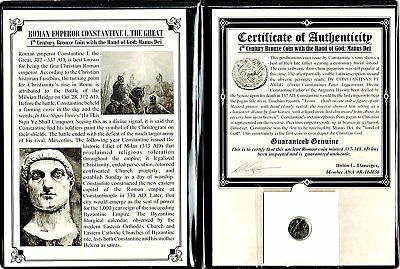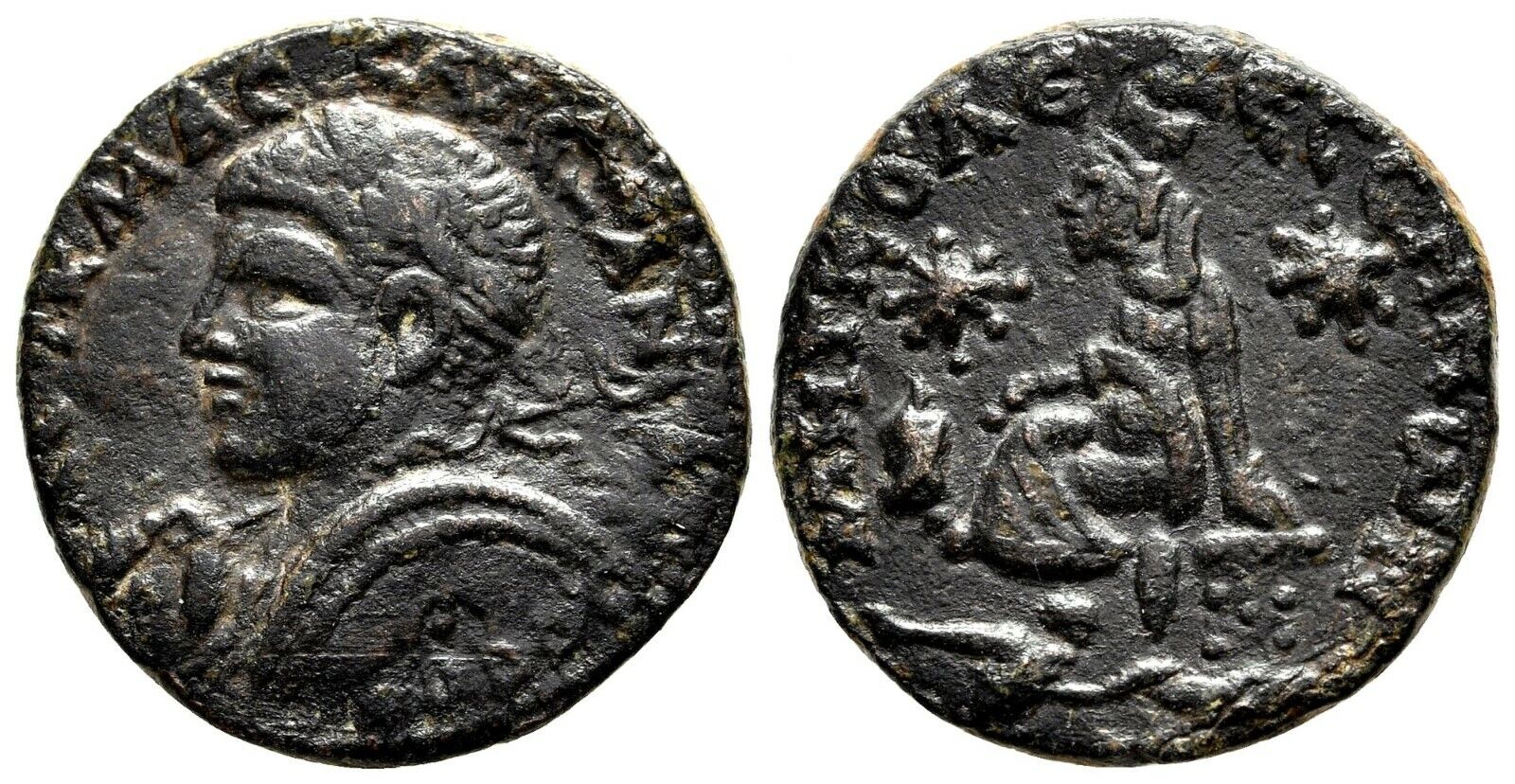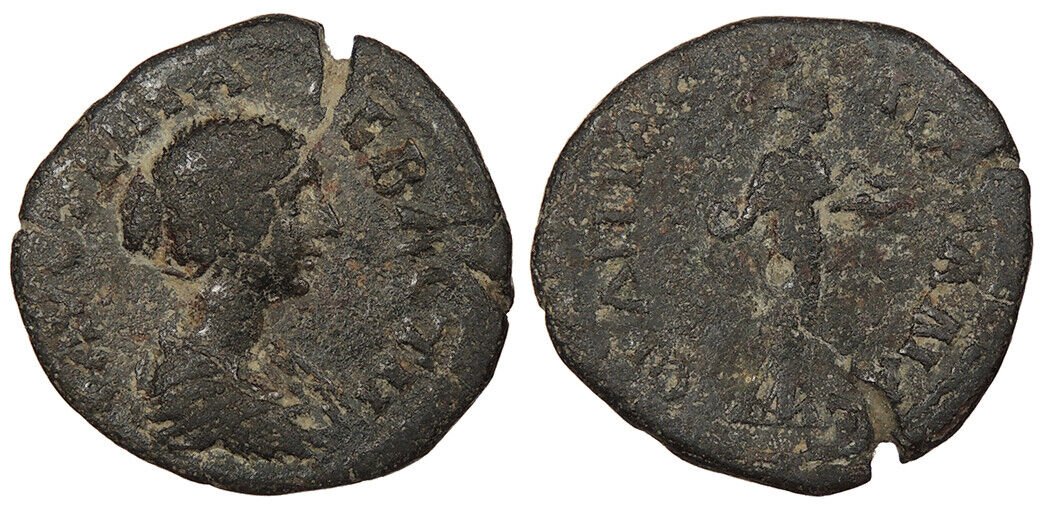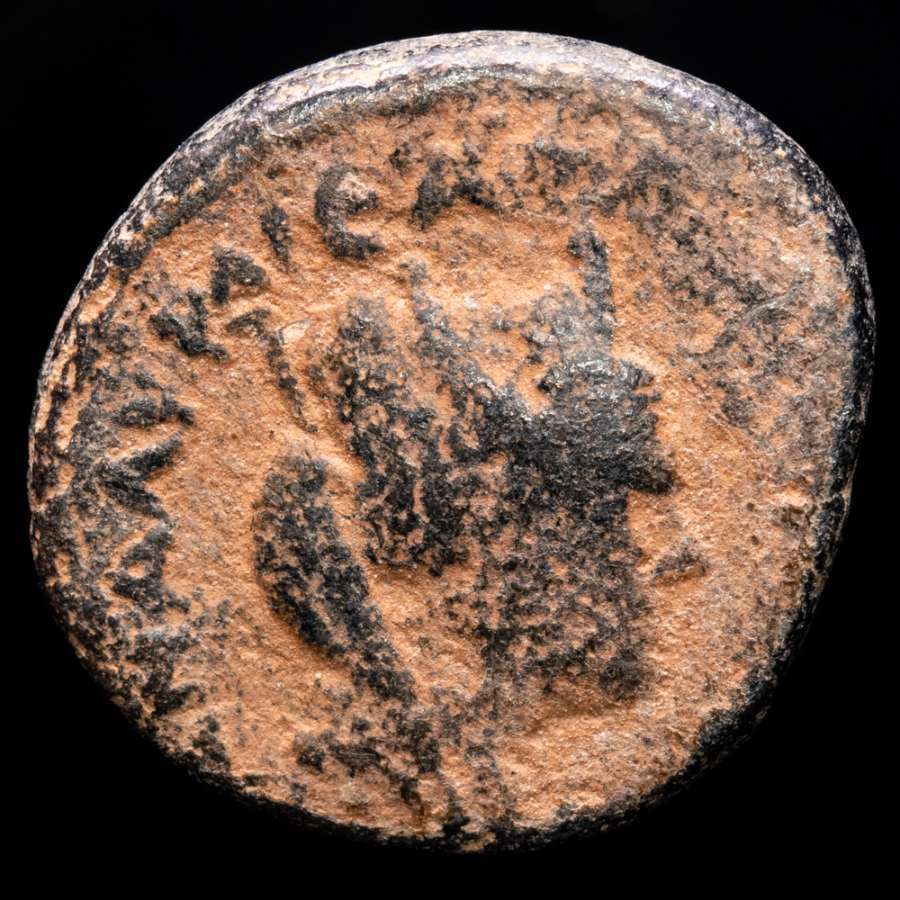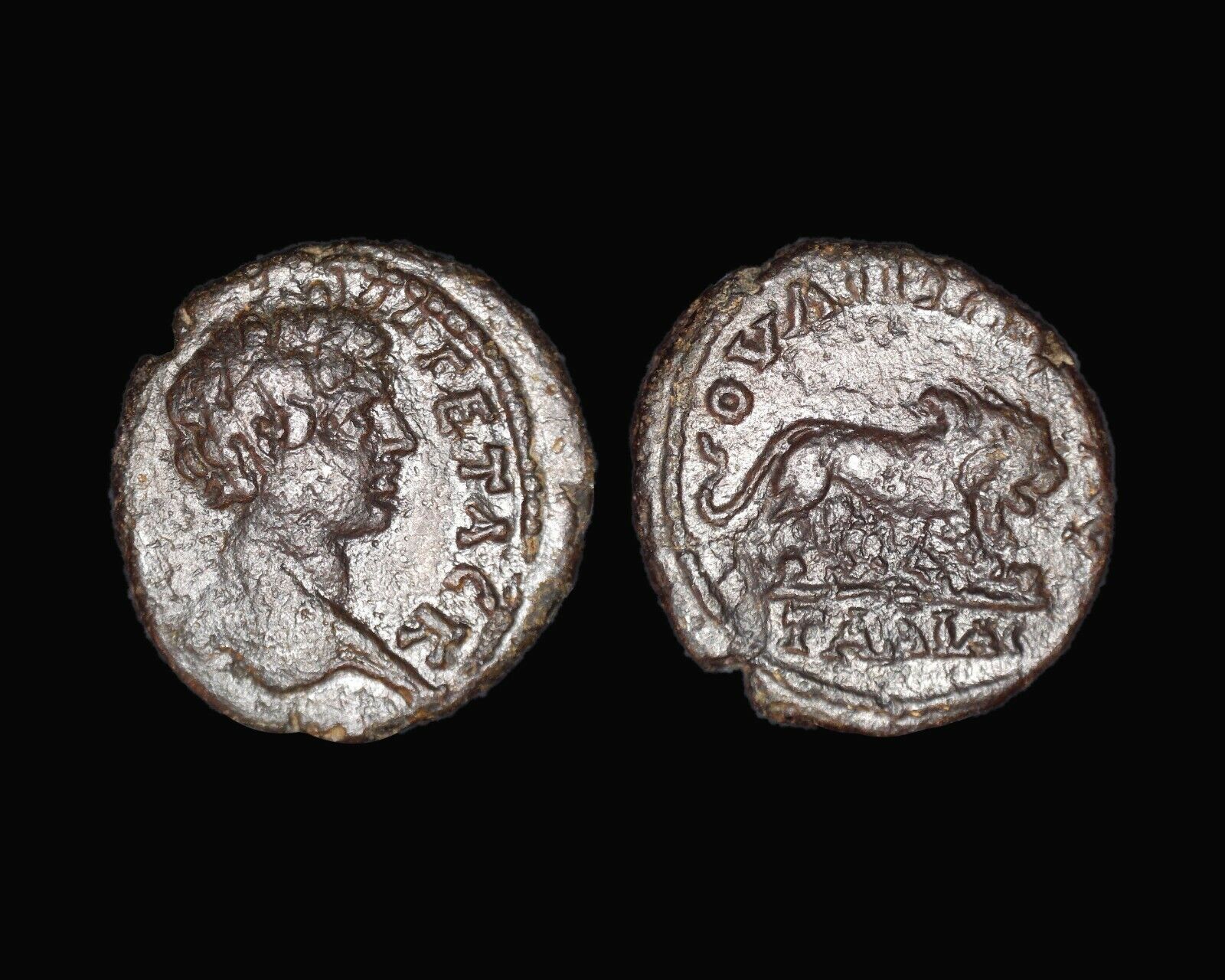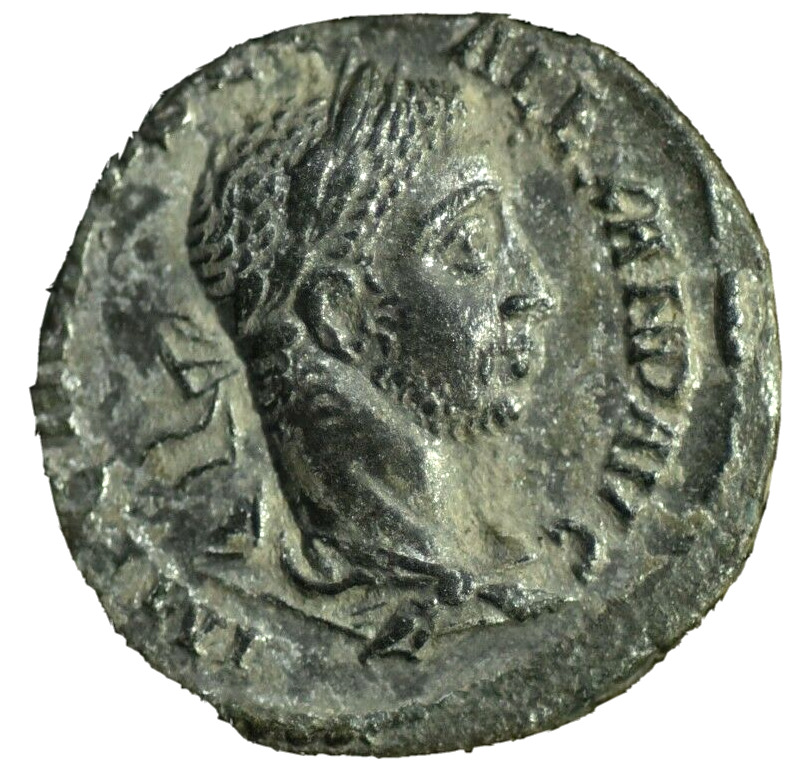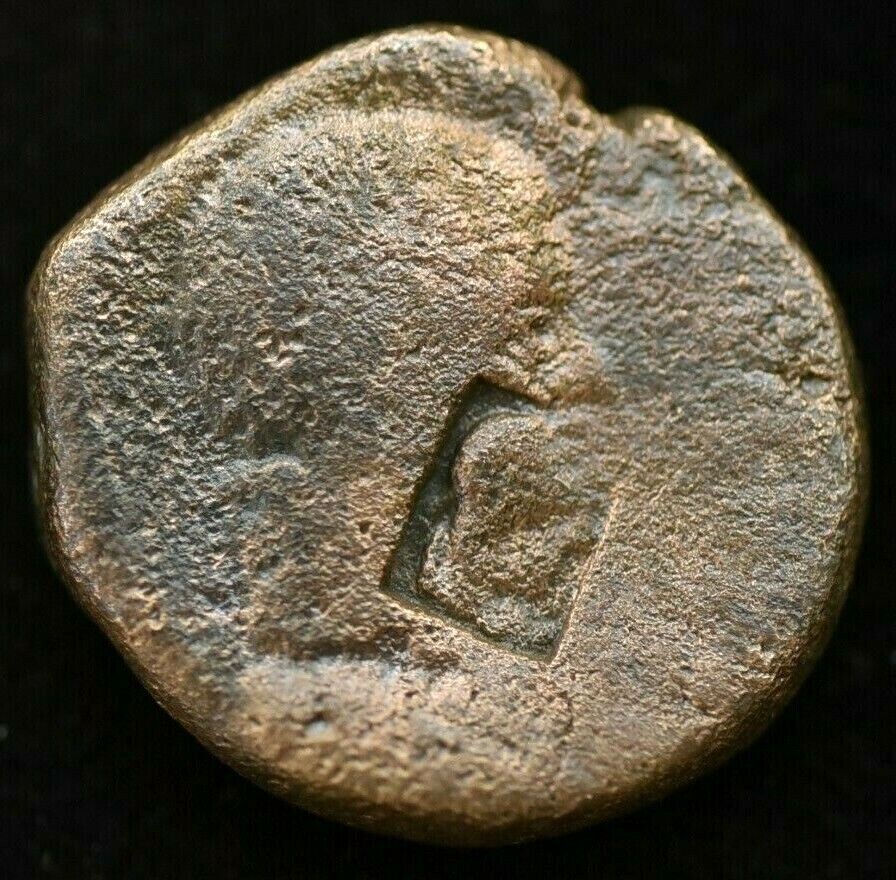-40%
SEPTIMIUS SEVERUS Rare Ancient Roman Coin Jupiter Zeus enthroned i48559
$ 42.24
- Description
- Size Guide
Description
Item:i48559
Authentic Ancient Coin of:
Septimius Severus
-
Roman Emperor
: 193-211 A.D. -
Bronze 17mm (2.52 grams) of
Roman provincial mint
AV KAI CE CEVHPOC, Laureate head right.
Zeus
enthroned left, holding patera and scepter.
You are bidding on the exact item pictured, provided with a Certificate of Authenticity and Lifetime Guarantee of Authenticity.
In the
ancient Greek
religion,
Zeus
was the "Father of Gods and men" (
πατὴρ ἀνδρῶν τε θεῶν τε
)
who ruled the Olympians of
Mount Olympus
as a father ruled the family. He was the
god of sky
and
thunder
in
Greek mythology
. His
Roman
counterpart is
Jupiter
and
Etruscan
counterpart is
Tinia
.
Zeus was the child of
Cronus
and
Rhea
, and the youngest of his siblings. In most traditions he was married to
Hera
, although, at the oracle of
Dodona
, his consort was
Dione
: according to the
Iliad
, he is the father of
Aphrodite
by Dione. He is known for his erotic escapades. These resulted in many godly and heroic offspring, including
Athena
,
Apollo
and
Artemis
,
Hermes
,
Persephone
(by
Demeter
),
Dionysus
,
Perseus
,
Heracles
,
Helen of Troy
,
Minos
, and the
Muses
(by
Mnemosyne
); by Hera, he is usually said to have fathered
Ares
,
Hebe
and
Hephaestus
.
As
Walter Burkert
points out in his book,
Greek Religion
, "Even the gods who are not his natural children address him as Father, and all the gods rise in his presence." For the Greeks, he was the
King of the Gods
, who oversaw the universe. As
Pausanias
observed, "That Zeus is king in heaven is a saying common to all men". In Hesiod's
Theogony
Zeus assigns the various gods their roles. In the
Homeric Hymns
he is referred to as the chieftain of the gods.
His symbols are the
thunderbolt
,
eagle
,
bull
, and
oak
. In addition to his Indo-European inheritance, the classical "cloud-gatherer" also derives certain iconographic traits from the cultures of the
Ancient Near East
, such as the
scepter
. Zeus is frequently depicted by Greek artists in one of two poses: standing, striding forward, with a thunderbolt leveled in his raised right hand, or seated in majesty.
In the
material culture
of
classical antiquity
, a
phiale
or
patera
(
Latin pronunciation:
[ˈpatera]
) is a shallow ceramic or metal
libation
bowl. It often has a bulbous indentation (
omphalos
, "bellybutton") in the center underside to facilitate holding it, in which case it is sometimes called a
mesomphalic phiale
. It typically has no handles, and no feet. (A drinking cup with handles is a
kylix
. A circular platter with a pair of C-handles is not a patera, but a few
paterae
have a single long straight handle.) Although the two terms may be used interchangeably, particularly in the context of
Etruscan culture
,
phiale
is more common in reference to Greek forms, and
patera
in a Roman setting.
Silver phiale (620-590 BC, from
Bayindir
village,
Elmali
, present-day Turkey
Octopus and dolphin motifs on a ceramic phiale (510–500 BC, from
Eretria
,
Euboea
)
Golden phiale (4th–3rd century BC)
Silver patera from
Hispania
(
Roman Spain
), 2nd–1st century BC)
Use
A youth pours a libation to the deceased within a
naiskos
,
a scene that may also represent
Ganymede
serving
Zeus
(
Apulian
red-figure
krater
, 340–320 BC)
Libation was a central and vital aspect of
ancient Greek religion
, and one of the simplest and most common forms of religious practice. It is one of the basic religious acts that define piety in ancient Greece, dating back to the
Bronze Age
and even
prehistoric Greece
. Libations were a part of daily life, and the pious might perform them every day in the morning and evening, as well as to begin meals. A libation most often consisted of mixed wine and water, but could also be unmixed wine, honey, oil, water, or milk.
The form of libation called
spondē
is typically the ritualized pouring of wine from a jug or bowl held in the hand. The most common ritual was to pour the liquid from an
oinochoē
(wine jug) into a phiale. Libation generally accompanied prayer. The Greeks stood when they prayed, either with their arms uplifted, or in the act of libation with the right arm extended to hold the phiale. After the wine offering was poured from the phiale, the remainder of the contents was drunk by the celebrant.
In
Roman art
, the libation is shown performed at an
altar,
mensa
(sacrificial meal table)
, or
tripod
. It was the simplest form of sacrifice, and could be a sufficient offering by itself. The introductory rite
(praefatio)
to an animal sacrifice included an incense and wine libation onto a burning altar. Both
emperors
and divinities are frequently depicted, especially on coins, pouring libations from a patera. Scenes of libation and the patera itself commonly signify the quality of
pietas
, religious duty or reverence.
Libation at a
symposium
(
Attic
red-figure cup, ca. 480 BC)
Apollo pouring a libation (Attic
white-ground
kylix
, ca. 460 BC)
Etruscan priest with phiale (2nd century BC)
Roman priest,
capite velato
(2nd–3rd century AD)
L
ucius Septimius Severus
(or rarely
Severus I
) (April 11, 145/146-February 4, 211) was a
Roman
general, and
Roman Emperor
from April 14, 193 to 211. He was born in what is now the
Berber
part of Rome's historic
Africa Province
.
Septimius Severus was born and raised at
Leptis Magna
(modern
Berber
, southeast of
Carthage
, modern
Tunisia
). Severus came from a wealthy, distinguished family of
equestrian
rank. Severus was of
Italian
Roman ancestry on his mother's side and of
Punic
or
Libyan
-Punic ancestry on his father's. Little is known of his father,
Publius Septimius Geta
, who held no major political status but had two cousins who served as consuls under emperor
Antoninus Pius
. His mother, Fulvia Pia's family moved from
Italy
to
North Africa
and was of the
Fulvius
gens, an ancient and politically influential clan, which was originally of
plebeian
status. His siblings were a younger
Publius Septimius Geta
and Septimia Octavilla. Severus’s maternal cousin was
Praetorian Guard
and consul
Gaius Fulvius Plautianus
.
In 172, Severus was made a
Senator
by the then emperor
Marcus Aurelius
. In 187 he married secondly
Julia Domna
. In 190 Severus became
consul
, and in the following year received from the emperor
Commodus
(successor to Marcus Aurelius) the command of the
legions
in
Pannonia
.
On the murder of
Pertinax
by the troops in 193, they proclaimed Severus Emperor at
Carnuntum
, whereupon he hurried to Italy. The former emperor,
Didius Julianus
, was condemned to death by the Senate and killed, and Severus took possession of Rome without opposition.
The legions of
Syria
, however, had proclaimed
Pescennius Niger
emperor. At the same time, Severus felt it was reasonable to offer
Clodius Albinus
, the powerful governor of Britannia who had probably supported Didius against him, the rank of Caesar, which implied some claim to succession. With his rearguard safe, he moved to the East and crushed Niger's forces at the
Battle of Issus
. The following year was devoted to suppressing Mesopotamia and other Parthian vassals who had backed Niger. When afterwards Severus declared openly his son
Caracalla
as successor, Albinus was hailed emperor by his troops and moved to Gallia. Severus, after a short stay in Rome, moved northwards to meet him. On
February 19
,
197
, in the
Battle of Lugdunum
, with an army of 100,000 men, mostly composed of
Illyrian
,
Moesian
and
Dacian
legions, Severus defeated and killed Clodius Albinus, securing his full control over the Empire.
Emperor
Severus was at heart a
soldier
, and sought glory through military exploits. In 197 he waged a brief and successful war against the
Parthian Empire
in retaliation for the support given to Pescennius Niger. The Parthian capital
Ctesiphon
was sacked by the legions, and the northern half of
Mesopotamia
was restored to Rome.
His relations with the
Roman Senate
were never good. He was unpopular with them from the outset, having seized power with the help of the military, and he returned the sentiment. Severus ordered the execution of dozens of Senators on charges of corruption and
conspiracy
against him, replacing them with his own favorites.
He also disbanded the
Praetorian Guard
and replaced it with one of his own, made up of 50,000 loyal soldiers mainly camped at
Albanum
, near Rome (also probably to grant the emperor a kind of centralized reserve). During his reign the number of legions was also increased from 25/30 to 33. He also increased the number of auxiliary corps (
numerii
), many of these troops coming from the Eastern borders. Additionally the annual wage for a soldier was raised from 300 to 500
denarii
.
Although his actions turned Rome into a military
dictatorship
, he was popular with the citizens of Rome, having stamped out the rampant corruption of Commodus's reign. When he returned from his victory over the Parthians, he erected the
Arch of Septimius Severus
in Rome.
According to Cassius Dio, however, after 197 Severus fell heavily under the influence of his Praetorian Prefect,
Gaius Fulvius Plautianus
, who came to have almost total control of most branches of the imperial administration. Plautianus's daughter,
Fulvia Plautilla
, was married to Severus's son, Caracalla. Plautianus’s excessive power came to an end in 205, when he was denounced by the Emperor's dying brother and killed. The two following
praefecti
, including the jurist
Aemilius Papinianus
, received however even larger powers.
Campaigns in Caledonia (Scotland)
Starting from 208 Severus undertook a number of military actions in
Roman Britain
, reconstructing
Hadrian's Wall
and campaigning in
Scotland
.
He reached the area of the
Moray Firth
in his last campaign in Caledonia, as was called Scotland by the Romans.. In 210 obtained a peace with the
Picts
that lasted practically until the final withdrawal of the Roman legions from Britain, before falling severely ill in
Eboracum
(
York
).
Death
He is famously said to have given the advice to his sons: "Be harmonious, enrich the soldiers, and scorn all other men" before he died at Eboracum on
February 4
,
211
. Upon his death in 211, Severus was
deified
by the Senate and succeeded by his sons,
Caracalla
and
Geta
, who were advised by his wife
Julia Domna
. The stability Severus provided the Empire was soon gone under their reign.
Accomplishments and Record
Though his military expenditure was costly to the empire, Severus was the strong, able ruler that Rome needed at the time. He began a tradition of effective emperors elevated solely by the military. His policy of an expanded and better-rewarded army was criticized by his contemporary
Dio Cassius
and
Herodianus
: in particular, they pointed out the increasing burden (in the form of taxes and services) the civilian population had to bear to maintain the new army.
Severus was also distinguished for his buildings. Apart from the triumphal arch in the Roman Forum carrying his full name, he also built the
Septizodium
in Rome and enriched greatly his native city of
Leptis Magna
(including another triumphal arch on the occasion of his visit of 203).
Severus and Christianity
Christians were
persecuted
during the reign of Septimus Severus. Severus allowed the enforcement of policies already long-established, which meant that Roman authorities did not intentionally seek out Christians, but when people were accused of being Christians they could either curse
Jesus
and make an offering to
Roman gods
, or be executed. Furthermore, wishing to strengthen the peace by encouraging religious harmony through
syncretism
, Severus tried to limit the spread of the two quarrelsome groups who refused to yield to syncretism by outlawing
conversion
to Christianity or
Judaism
. Individual officials availed themselves of the laws to proceed with rigor against the Christians. Naturally the emperor, with his strict conception of law, did not hinder such partial persecution, which took place in
Egypt
and the
Thebaid
, as well as in
Africa proconsularis
and the East. Christian
martyrs
were numerous in
Alexandria
(cf.
Clement of Alexandria
,
Stromata
, ii. 20;
Eusebius
,
Church History
, V., xxvi., VI., i.). No less severe were the persecutions in Africa, which seem to have begun in 197 or 198 (cf.
Tertullian's
Ad martyres
), and included the Christians known in the
Roman martyrology
as the martyrs of
Madaura
. Probably in 202 or 203
Felicitas
and
Perpetua
suffered for their faith. Persecution again raged for a short time under the proconsul
Scapula
in 211, especially in
Numidia
and
Mauritania
. Later accounts of a
Gallic
persecution, especially at
Lyon
, are legendary. In general it may thus be said that the position of the Christians under Septimius Severus was the same as under the
Antonines
; but the law of this Emperor at least shows clearly that the
rescript
of
Trajan
[
needed
clarification
]
had failed to execute its purpose.
Frequently Asked Questions
How long until my order is shipped?
Depending on the volume of sales, it may take up to 5 business days for shipment of your order after the receipt of payment.
How will I know when the order was shipped?
After your order has shipped, you will be left positive feedback, and that date should be used as a basis of estimating an arrival date.
After you shipped the order, how long will the mail take?
USPS First Class mail takes about 3-5 business days to arrive in the U.S., international shipping times cannot be estimated as they vary from country to country. I am not responsible for any USPS delivery delays, especially for an international package.
What is a certificate of authenticity and what guarantees do you give that the item is authentic?
Each of the items sold here, is provided with a Certificate of Authenticity, and a Lifetime Guarantee of Authenticity, issued by a world-renowned numismatic and antique expert that has identified over 10000 ancient coins and has provided them with the same guarantee. You will be quite happy with what you get with the COA; a professional presentation of the coin, with all of the relevant information and a picture of the coin you saw in the listing.
Compared to other certification companies, the certificate of authenticity is a -50 value. So buy a coin today and own a piece of history, guaranteed.
Is there a money back guarantee?
I offer a 30 day unconditional money back guarantee. I stand behind my coins and would be willing to exchange your order for either store credit towards other coins, or refund, minus shipping expenses, within 30 days from the receipt of your order. My goal is to have the returning customers for a lifetime, and I am so sure in my coins, their authenticity, numismatic value and beauty, I can offer such a guarantee.
Is there a number I can call you with questions about my order?
You can contact me directly via ask seller a question and request my telephone number, or go to my About Me Page to get my contact information only in regards to items purchased on eBay.
When should I leave feedback?
Once you receive your order, please leave a positive. Please don't leave any negative feedbacks, as it happens many times that people rush to leave feedback before letting sufficient time for the order to arrive. Also, if you sent an email, make sure to check for my reply in your messages before claiming that you didn't receive a response. The matter of fact is that any issues can be resolved, as reputation is most important to me. My goal is to provide superior products and quality of service.



